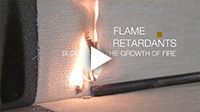

About VECAP
The VECAP programme has evolved from its original concept of a tool to control emissions during handling and use of brominated flame retardants (BFRs) into a system for more efficient management of chemicals, which can be applied to a much wider range of processes and raw materials.
The origins of the VECAP programme lie with the UK Textile Finishers Association (TFA), who in 2004 initiated a Code of Good Practice that called on the UK textiles industry to audit their processes, and take action to reduce Deca-BDE emissions from their processes. These actions ranged from simple adjustments in working practices to the installation of an effluent treatment plant. The companies involved varied in size from 7 to 350 employees. In the last 4 years, regular surveys of the UK situation have shown excellent progress towards making sure that emissions from processing are highly regulated and controlled. After impressive first results, later gains were often more difficult to achieve, requiring a blend of changed practices and investment in innovative technology in the plant. Today, uncontrolled emissions have been virtually stopped. VECAP has delivered clear results for the UK Textile Industry.
From this promising start, the program has been adapted to meet the wider needs of the European textile and plastics industries, and has been introduced in North America and in Japan with notable successes, as documented by the Annual Progress Reports.
More importantly, VECAP principles have been adapted to users of other flame retardants, and have been recognised as providing a materials management system applicable to other chemicals in other industries.

-
"VECAP is a great example of how chemicals need to be managed in the 21st Century, true producer responsibility."Mike Barry, Head of Corporate Social Responsibility, Marks & Spencers









